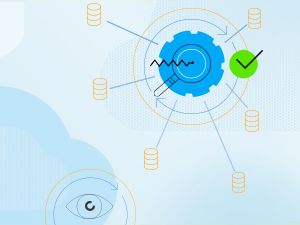Boosting Developer Productivity with Progress OpenEdge 12.8

As the demand for efficient and feature-rich applications rises, developers need dependable tools and technologies to enhance their productivity. Progress OpenEdge 12.8 fills that need.
Progress OpenEdge 12.8 brings the latest and greatest range of features to boost developer productivity in 12.8. This blog post explores how these features enable developers to create applications more efficiently while reducing development costs.
OpenTelemetry Performance Tracing and Metrics Support
OpenEdge 12.8 integrates OpenTelemetry, a powerful observability framework, to provide developers with deep insights into application performance. OpenTelemetry tracing allows developers to identify code bottlenecks and optimize application performance by visualizing ABL-specific performance data. The support for OpenTelemetry metrics will enable developers to configure, view and analyze trace data for ABL Procedures, Classes and Transactions while facilitating performance tuning of the OpenEdge database and PAS for OpenEdge servers. This helps business applications operate more smoothly and efficiently.
Support for OOABL Collections
OpenEdge 12.8 includes native support for Object-Oriented Advanced Business Language (OOABL) collections such as List, SortedSet and HashMap. By leveraging these built-in collections, developers can benefit from improved performance as they are implemented using native C code. Additionally, developers can overcome the size limitations of ABL's array support, leading to more efficient application development and optimized resource utilization.
Improvements in Progress Developer Studio for OpenEdge
This release significantly enhances the Progress Developer Studio for OpenEdge (PDSOE), the integrated development environment (IDE) for OpenEdge applications. These improvements include:
- Incremental Compilation Support: With incremental compilation, developers can save valuable time by only compiling the files affected by a code change rather than the entire workspace. This feature helps accelerate development iterations and reduces compilation overhead.
- Hyperlink to Declaration and Implementations: PDSOE allows developers to instantly navigate their source code by pressing a key. This functionality is especially useful when dealing with large codebases and improves code exploration and comprehension.
- Type Hierarchy View for OOABL: Type Hierarchy View in PDSOE enhances ABL developer productivity. This feature provides a clear visualization of class hierarchies, aiding developers in understanding the relationships between classes and facilitating object-oriented programming.
Greater Protections for Compiled OpenEdge Code
Now developers can focus on enhancing the security of compiled OpenEdge application code. Developers can help protect their compiled code from corruption or tampering with new features like code signing and validation. This furthers the integrity and authenticity of the application, providing peace of mind and enhanced safeguarding of valuable intellectual property.
Modernized ABL Language Syntax
Progress OpenEdge 12.8 includes shorthand notations and extensions for common assignment operations using the equals operator to streamline and modernize the ABL language. These language enhancements simplify coding and allow developers to express assignments more concisely, resulting in cleaner and more readable code.
New VAR Statement
The VAR statement in OpenEdge has been enhanced in 12.8, offering developers increased functionality and flexibility. Additionally, the VAR statement allows expressions during variable initialization, empowering developers with customization options. OpenEdge 12.8 improves coding efficiency and provides a more streamlined development experience by facilitating direct instantiation of class variables within the variable declaration. Developers can now create multiple classes within a class variable array, enabling more versatile implementations.
Server-Side Aggregation Support
OpenEdge 12.8 includes server-side aggregation support for Count, Average and Sum operations. This enhancement improves the usability of aggregates in ABL applications, resulting in improved performance and faster data retrieval. Developers can leverage these new functions to optimize data processing and achieve efficient application performance, whether working with indexed or non-indexed columns.
Progress Application Server for OpenEdge (PAS for OpenEdge) Enhancements
PAS for OpenEdge has several notable improvements in 12.8, focused on security and session lifecycle management.
JWE Token Support
PAS for OpenEdge supports JWE tokens, better streamlining integration into enterprises with strict security policies that require JWE-encoded forms of JWT tokens. This helps facilitate compliance with user privacy and confidentiality regulations.
Enhanced Session Lifecycle Management
Developers gain more control over PAS for OpenEdge sessions, allowing them to manage sessions based on various factors such as time, number of requests, memory usage or temp-table limits. This flexibility provides more efficient resource utilization and improved application performance.
OpenID Connect Support
PAS for OpenEdge includes support for OpenID Connect, a widely adopted identity protocol. This enables user authentication and returns user information to the application via an Identity Token, helping to facilitate more secure user access.
Progress OpenEdge 12.8 empowers developers with an array of features to increase productivity and streamline the development process. With support for OOABL collections, enhanced developer tools in PDSOE, improved language syntax, advanced security measures and integrated performance tracing and metrics support, developers can more efficiently build robust applications while reducing development costs.
By embracing the power of Progress OpenEdge 12.8, developers can unlock their full potential and deliver exceptional business solutions in less time.
To learn more, watch our “Did You Know? Developer Productivity” webinar.

Jessica Malakian
Jessica Malakian is a product marketing specialist at Progress who focuses primarily on Progress OpenEdge. Jessica is a recent college graduate and is excited to begin her professional journey with Progress. Outside of work, Jessica loves reading and writing.
Next:
Comments
Topics
- Application Development
- Mobility
- Digital Experience
- Company and Community
- Data Platform
- Security and Compliance
- Infrastructure Management
Sitefinity Training and Certification Now Available.
Let our experts teach you how to use Sitefinity's best-in-class features to deliver compelling digital experiences.
Learn MoreMore From Progress
Latest Stories
in Your Inbox
Subscribe to get all the news, info and tutorials you need to build better business apps and sites
Progress collects the Personal Information set out in our Privacy Policy and the Supplemental Privacy notice for residents of California and other US States and uses it for the purposes stated in that policy.
You can also ask us not to share your Personal Information to third parties here: Do Not Sell or Share My Info
We see that you have already chosen to receive marketing materials from us. If you wish to change this at any time you may do so by clicking here.
Thank you for your continued interest in Progress. Based on either your previous activity on our websites or our ongoing relationship, we will keep you updated on our products, solutions, services, company news and events. If you decide that you want to be removed from our mailing lists at any time, you can change your contact preferences by clicking here.


